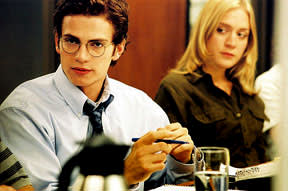Context and depth of analysis are the two things that the DVD revolution is bringing to the understanding of mainstream movies, but sometimes it comes at the expense of the feature film itself. Take the story of Stephen Glass, told in as a feature by first-time director Billy Ray. Glass (Hayden Christensen) is a hot young writer at august political magazine The New Republic in the late '90s; the rising star, at age 24, is already contributing to the likes of Rolling Stone and George, and his knack for finding just the right story seems uncanny. Turns out it was Glass, it turns out, was playing footsie with the truth in an increasing number of his feature pieces. From that compelling true story, Billy Ray (as a writer responsible for the likes of Hart's War and Volcano) makes a watchable but not particularly insightful film that paces through the discovery, by Forbes' online magazine, that Glass was "cooking" his pieces. Hayden Christensen does an able job of nerding his way out from under Darth Vader's mask but the revelation of this film is the performance of Peter Sarsgaard as Chuck Lane, Glass's editor at The New Republic. His combination of insecure professional jealousy (at Glass's rising star), reluctant support for his writer and suspicion that something is up is one of the quietest, most nuanced pieces of acting work this year. But for all the material Ray has to work with, the film tries to get in the story's way on too many occasions. The framing device of Stephen Glass telling his story to his old high school writing class seems strangely forced. (As we discover on the commentary, it was.) The subject fascinates and the actors compel but the filmmaking in the end comes off only as so much dramatic re-enactment. Part of the reason is that Billy Ray given the film's subject matter is obsessed with getting the facts straight, from story pitches to wardrobe to the specifics of Glass's notes. It's an admirable effort, but more time should have been spent on the dramatic arc instead of the brand of pen on desks. And as usual with these sorts of films, contributions from the real people turn out to be more fascinating than the dramatised story. Glass's real editor, Chuck Lane, sits in for a commentary with Ray and his insights into exactly how this went down are fascinating. And we get a sense of the spin the real Stephen Glass is able to put on any story in a 60 Minutes piece included here. Too bad Billy Ray wasn't able to spin his own efforts as effectively. Shattered Glass is a good time Sunday night TV movie, but not the insightful piece of art it could have been. (Lions Gate)
Shattered Glass
Billy Ray

BY James KeastPublished Mar 1, 2004